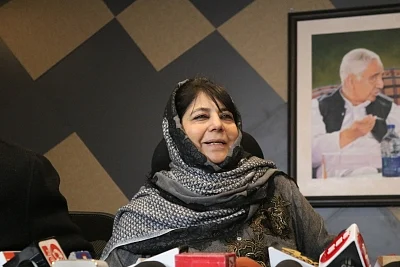By Sheikh Qayoom
Srinagar, March 1 (IANS) For Jamaat-e-Islami (JI) Jammu and Kashmir the ban imposed on the socio-political religious organisation by the union government is not the first and perhaps not the last.
The government on Thursday declared the JI Jammu and Kashmir as "an unlawful association whose activities have the potential of disrupting the unity and integrity of India".
Before imposing the five-year-long ban, more than 250 leaders and cadres of the organisation were picked up by police during nocturnal raids throughout the Valley.
After lodging them in local police stations, many senior leaders of the JI have been shifted to the central jail in Srinagar city.
The Joint Resistance Leadership (JRL), the separatist conglomerate headed by Syed Ali Geelani, Mirwaiz Umer Farooq and Muhammad Yasin Malik, called for post Friday prayer protests against the ban.
The authorities reacted by imposing restrictions in parts of Srinagar city to prevent any protests.
The ban order has been criticised by some mainstream politicians, including former Chief Minister Mehbooba Mufti.
Mehbooba said: "Democracy is a battle of ideas. The crackdown, followed by the banning of Jammat Islami is condemn able and another example of high handedness and muscular approach of the GOI (Govenment of India) to deal with the political issue of J&K".
Separatist leaders in both the Syed Ali Geelani headed group and Mirwaiz Umer headed Hurriyat group have condemned the ban with one voice.
The authorities have placed Mirwaiz Umer under house arrest while Geelani continues to be under house arrest in Srinagar city.
Muhammad Yasin Malik is also under preventive detection.
JI Jammu and Kashmir is distinct from Jamaat-e-Islami Hind that was founded in 1948 as an Islamic organisation, but finally split into three offshoots in India, Pakistan and Bangladesh.
The founder of the Jamaat-e-Islami Hind, Sayyid Abul Ala Maududi, however, continues to the beacon light for the JI J&K as well.
The JI was first banned in 1975 during the emergency for opposing the Indira-Abdullah accord that finally brought back the National Conference (NC) founder, Sheikh Muhammad Abdullah, into mainstream politics.
The organisation was again banned by the central government headed by V.P.Singh in 1990. That order was revoked in 1993 by the P.V. Narasimha Rao headed Congress government.
JI leaders, including Muhammad Yusuf Shah, who later became the supreme commander of the Hizbul Mujahideen outfit in his new avatar as Syed Salahudin, fought the 1987 assembly elections with other leaders who opposed the NC under the banner of the Muslim United Front (MuF).
It is generally believed that many JI candidates, including Muhammad Yusuf Shah were defeated by a false declaration of results.
Senior JI leader Geelani, however, won the 1987 assembly elections repeating his victories in 1972 and 1977.
Geelani has been a part of the state's electoral process till the JI decided to say goodbye to mainstream politics after 1990.
Many people believe that the single biggest reason for the JI cadres supporting militancy and separatism was their engineered defeat during the 1987 elections.
After ending their association with electoral politics, senior JI leaders supported the state's merger with Pakistan, although the JI cadres did not initially pick up weapons to join the armed struggle till militancy took the centre stage in the Valley in 1989.
Since the pro-azadi Jammu and Kashmir Liberation Front (JKLF) advocated an
independent state free from both India and Pakistan, the Hizbul Mujahideen (HM) that had a predominant number of youth belonging to families of JI cadres was formed in September 1989.
HM stands for state's merger with Pakistan.
After the HM was formed, the official crackdown on JI-run schools and other
organisations involved in fund raising started.
Geelani, who heads his faction of the separatist Hurriyat group, has formed his own organisation called the Tehreek-e-Hurriyat, but continues to wield both respect and influence in the JI.
(Sheikh Qayoom can be reached at sheikh.abdul@ians.in)
--IANS
sq/vm
(This story was auto-published from a syndicated feed. No part of the story has been edited by The Quint.)
(At The Quint, we question everything. Play an active role in shaping our journalism by becoming a member today.)
